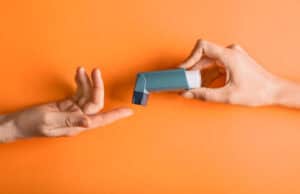Understanding the signs of an asthma attack and knowing when to seek emergency medical help can make all the difference. Asthma attacks occur when the airways become inflamed and narrow, making it difficult to breathe. The severity of asthma attacks can vary, but it’s vital to recognize the warning signs early.

Make sure your loved ones have access to their inhalers in case of an asthma emergency.
Recognizing an Asthma Attack
Common Symptoms of an Asthma Attack:
- Severe Shortness of Breath: Difficulty catching your breath or feeling like you can’t get enough airy.
- Chest Tightness or Pain: A feeling of pressure or constriction in the chest.
- Wheezing: A high-pitched whistling sound when breathing.
- Coughing: Persistent cough, especially at night or early in the morning.
- Rapid Breathing: Breathing faster than normal, often shallow and quick.
- Blue Lips or Face: A sign of severe oxygen deprivation.
- Difficulty Speaking: Inability to speak in full sentences without pausing to breathe.
When to Seek Emergency Care
While mild asthma attacks can often be managed at home with a rescue inhaler, severe asthma attacks require immediate medical attention. Here are some indicators that you should head to the ER:
- Symptoms Worsen Rapidly: If symptoms escalate quickly despite using your rescue inhaler.
- No Improvement After Inhaler Use: If there’s little to no relief after taking prescribed asthma medication.
- Severe Breathing Difficulty: Struggling to breathe, talking in short phrases, or inability to talk.
- Peak Flow Meter Readings: If your peak flow meter readings are in the red zone, indicating severely reduced lung function.
- Persistent Symptoms: If symptoms persist for an extended period without improvement.
- Blue Lips or Face: Cyanosis, or a bluish tint to the lips or face, is a medical emergency indicating a lack of oxygen.
What to Expect in the ER
When you arrive at the emergency room with an asthma attack, the medical team will:
- Assess Your Condition Quickly: Immediate evaluation to determine the severity of your asthma attack.
- Administer Oxygen Therapy: To help restore normal breathing and oxygen levels.
- Provide Bronchodilators: Medications to open up the airways quickly.
- Monitor Vital Signs: Continuous monitoring to ensure stability and improvement.
Trust Ally Medical ER for Immediate Care
If you or a loved one is experiencing a severe asthma attack, don’t hesitate to seek emergency care. Your health and safety are the top priorities.
For immediate medical attention, visit your nearest Ally Medical ER. If you have questions or need more information about managing asthma, consult with a healthcare provider.



